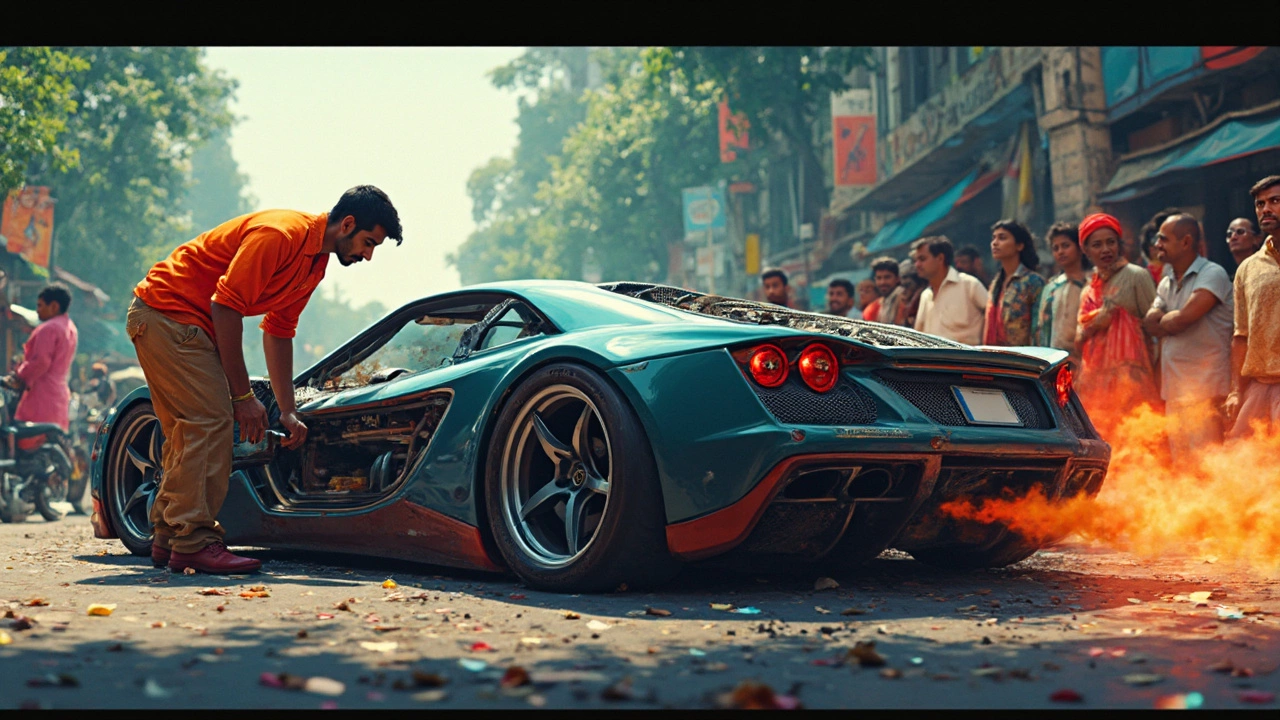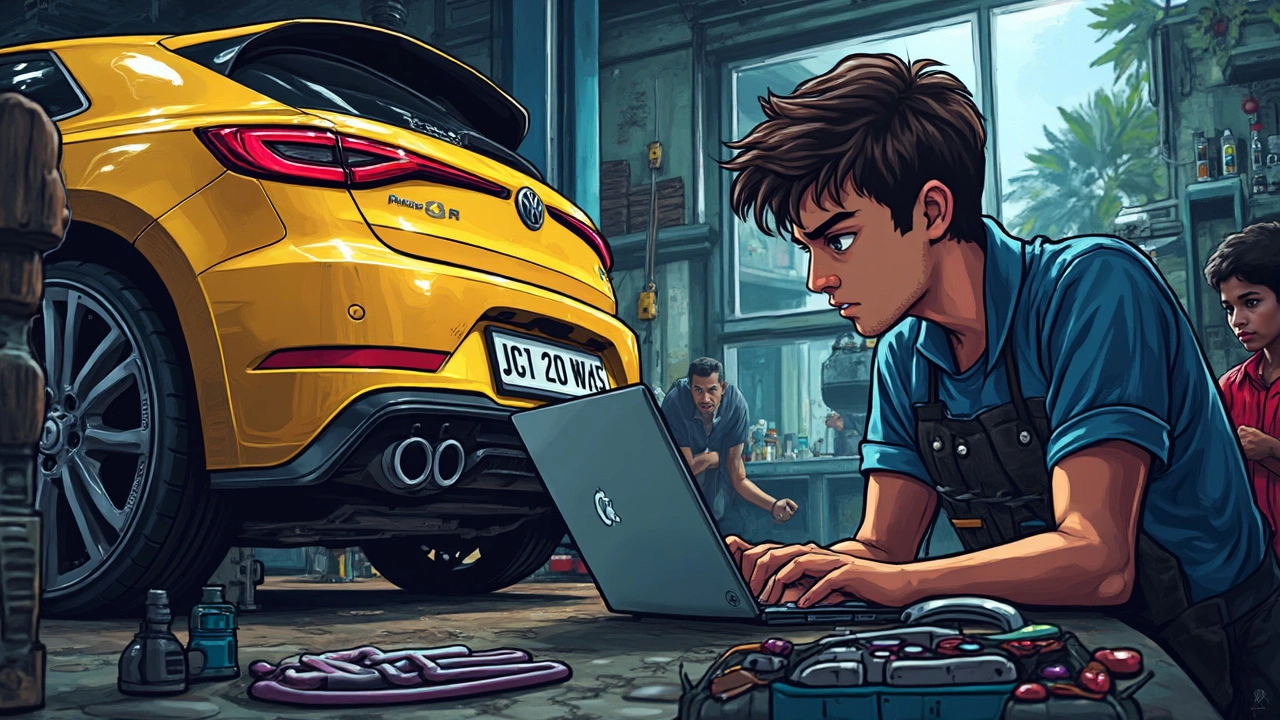Why Does an Exhaust Pop: The Lowdown on Noisy Exhausts
 Mar, 15 2025
Mar, 15 2025
Ever heard a car zip by and wondered why it sounded like it was popping popcorn? That's the exhaust pop, and it's all the rage for custom exhaust fans. So, what's going on? At its core, exhaust popping happens when unburned fuel ignites in the exhaust system. This creates that sharp, popping sound that car enthusiasts love.
Now, it's not just random noise. It's about how your engine's fuel is burning. If there's leftover fuel that doesn't get burned in the combustion chamber, it moves through the exhaust and ignites, usually when you lift your foot off the accelerator. This popping can be tuned to your liking—yes, turning car sounds into your personal playlist.
But how do you get that perfect pop with a custom exhaust? Choice of materials and design plays a part. Some systems are designed to amplify certain frequencies, making pops more pronounced and exciting. Tinker with the air-fuel ratio and ignition timing, and you've got a recipe for some seriously catchy pops.
- The Science Behind Exhaust Pops
- How Custom Exhausts Influence Sound
- Tips for Achieving the Desired Exhaust Pop
- Understanding the Downsides
The Science Behind Exhaust Pops
So, what makes an exhaust pop? If we dive under the hood, it all starts with how your car handles fuel. When you accelerate, your engine injects fuel and air mix into the combustion chamber. Ideally, all of this mix should burn completely for maximum power. But here's the twist—it doesn't always happen.
Unburned Fuel in the System
If the air-fuel mix doesn't burn entirely, unburned fuel can sneak out of the combustion chamber and end up in the exhaust. This is where the fun begins. In the exhaust system, hot surfaces or even just hot gases can ignite this leftover fuel, resulting in the popping sound car lovers adore.
Role of Engine Timing
Timing is pretty key here. If your engine's timing is retarded (ignition happens later than usual), it can increase the chances of unburned fuel hitting the exhaust. This effectively sets the stage for those pops.
Factors That Amplify Pops
Aside from fuel and timing, other tweaks like adjusting the custom exhaust's setup can affect sound. Wide open throttle and high RPMs create a higher chance of pops because they dump more fuel into the system. Playing with your car modification's settings can help you dial in the sound you're aiming for.
| Condition | Effect on Popping |
|---|---|
| Lean Air-Fuel Mix | Less Popping |
| Rich Air-Fuel Mix | More Popping |
| Advanced Timing | Less Popping |
| Retarded Timing | More Popping |
In short, if you're chasing that perfect, crisp exhaust pop, you'll want to uncover the right blend of unburnt fuel, timing, and exhaust system setup. With the right tweaks, your car's sound can be music to your ears.
How Custom Exhausts Influence Sound
If you've ever wondered why some cars sound like they're roaring with personality, it's all thanks to custom exhausts. These systems are not just for show; they play a big role in shaping the sound of your vehicle.
The Role of Design and Material
The way an exhaust is designed can seriously change its sound profile. Wider pipes, different materials, and unique layouts can transform that modest rumble into a robust roar. Stainless steel is often favored for its durability and the way it resonates sound. Meanwhile, the shape of the muffler can amplify or mute popping sounds.
Take it from renowned auto tuner, Sam Richards:
"A custom exhaust is like a musical instrument for your car. It’s all about how you want your ride to sing."
Tuning Techniques
There are a few key parts in the exhaust system where you can make changes. Headers, cat-backs, and mufflers all contribute to what you hear when you rev the engine. For those chasing that perfect pop, adjusting the air-fuel mixture and ignition timing can work wonders.
Additionally, you might look into resonator deletes. While these might increase overall noise levels, they can add a distinctive character to the exhaust notes. Consider consulting with professionals to achieve the desired sound in line with legal considerations.
Balancing Sound and Performance
Here’s the kicker: louder isn't always better. It's about finding the right balance of sound and performance. A well-set-up custom exhaust can improve the flow of exhaust gases, potentially offering performance gains. But overdoing it can lead to unwanted noise without any benefits in horsepower.
| Component | Effect on Sound |
|---|---|
| Headers | Improves exhaust flow, can deepen sound |
| Cat-back | Can adjust overall noise and refine exhaust note |
| Mufflers | Reduce noise, customize pops and growls |
So whether you’re after a gentle purr or a beastly roar, remember that tailoring your car’s exhaust involves a careful mix of components and tuning. After all, your car's sound should be as unique as your driving style.

Tips for Achieving the Desired Exhaust Pop
So, you're aiming to have your car's exhaust pop just the way you've heard on those street machines? Let's look at a few practical tips to get there.
Understand the Basics of Air-Fuel Ratio
Getting the right pop starts with adjusting your air-fuel ratio. A slightly richer mixture, more fuel than air, often increases the likelihood of unburned fuel reaching your custom exhaust system. This is where the pop magic happens!
Consider Aftermarket Exhaust Systems
Opt for custom exhaust systems designed with popping in mind. Stainless-steel variants, with proper muffler designs, can enhance the popping effect due to their acoustics. Remember, not all aftermarket systems are created equal—choose one that suits your popping aspirations.
Tweak the Ignition Timing
If you're comfortable with engine mods, adjusting ignition timing can also be an avenue to explore. Delaying the timing a bit gives fuel the chance to combust in the exhaust, creating that desired pop.
Install a Pop and Bang Tuning File
Some car owners go technological with a pop and bang tuning file. This file, uploaded to your car's ECU, controls the amount of fuel entering your engine, ensuring more fuel is left to pop in the exhaust. It's techy, but straightforward with the right guidance.
Maintain Regular Checks
At the end of the day, what's crucial is regular maintenance of your engine and exhaust system. Check for leaks that might affect performance and consult a pro if you're not sure where to start.
Here's a quick fact for numbers folks. A well-tuned exhaust pop can reduce back pressure by up to 10%, aiding efficiency and boosting that sweet sound you're chasing.
Understanding the Downsides
While that popping sound can be the talk of the town, it doesn't come without its issues. One of the main concerns is engine efficiency. Those loud pops mean not all the fuel is being burned where it should—in the engine. This can lead to increased fuel consumption, which no one enjoys at the pump.
Another problem? Custom exhausts with a deliberate exhaust pop can sometimes cause your car to fail emissions tests. Many regions have strict standards in place, and having too much unburned fuel ignite in the exhaust can land you in trouble with the local authorities. It's something to keep in mind if your car is your daily driver as well as your weekend toy.
Long-Term Vehicle Health
All that unburned fuel igniting is essentially small explosive events in your exhaust system. While this might seem cool or even harmless, over time, it can contribute to wear and tear on your exhaust components. Catalytic converters are especially susceptible to damage, and replacing them isn’t cheap.
The noise factor is another consideration. While some enthusiasts love it, your neighbors might not be fans of your exhaust symphony, especially early in the morning or late at night. There's a fine line between attention-grabbing and annoying.
Cost Implications
Customizing or modifying your exhaust to perfect that sound isn't free. The price can vary greatly depending on your car model and the complexity of the modifications. Plus, if you're not doing the work yourself, labor costs can stack up quickly.
So, while getting that perfect exhaust pop might be a thrilling project, keep in mind these potential downsides. Consider how they stack against the benefits of roaring down the open road in style. Do you want the car to turn heads for all the right reasons?